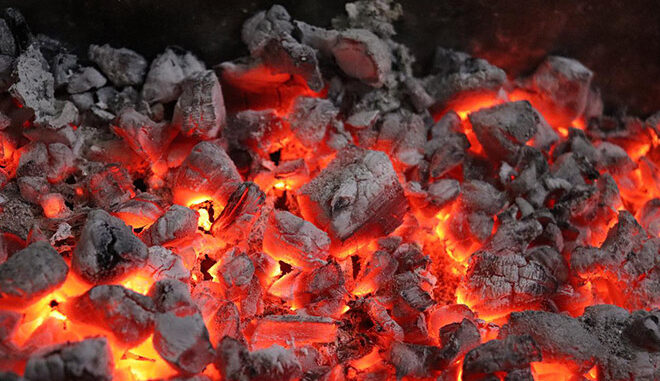
As much as 70 percent of European heating comes from natural gas and electricity, and with Russian deliveries drastically reduced, wood — already used by some 40 million people for heating — has become a sought-after commodity. Prices for wood pellets nearly doubled to 600 euros a ton in France, and there are signs of panic buying. Hungary has banned exports of pellets, and Romania capped firewood prices for six months. Wood stoves that are high in demand can take months to deliver. In France, there are signs of hoarding as some buyers have bought two tons of wood pellets, when less than one ton is normally enough to heat a home for a year. In Berlin, the energy crisis brings reminders of the desolation following World War II when residents chopped down nearly all the trees in the central Tiergarten park for heating fuel.
Germany, faced with a cold winter without cheap Russian natural gas, has cooled its enthusiasm, at least temporarily, for “green policies” and turned to coal. RWE, Germany’s largest energy company, received permission to mine an open pit coal mine in the Western village of Lützerath. German officials believe that any increase in coal emissions will be offset by the fact that RWE agreed to end its coal use by 2030. In June, Germany announced the reopening of some coal plants despite agreeing months earlier to speed up its exit from coal by eight years. When a drought this summer slowed coal transport on rivers, the government gave cargo trains carrying coal and other fuels priority over passenger trains. A poll taken this summer found that 56 percent of Germans were in favor of turning coal plants back on, with just 36 percent against, which compares to 73 percent of the population that supported ending coal use “as soon as possible” in a 2019 poll. This was one year after President Trump warned Germany against reliance upon Russian energy.
Since the crisis began, Germany has increased its coal-generated electricity by almost 5 percent. Coal currently accounts for nearly a third of all electricity generated in Germany. Much of that coal comes from places like the Garzweiler mine near Lützerath, which is owned by RWE and where machines continuously work the 12-square-mile pit. At one time, the country was dependent on coal and there was even a legal requirement for residents to move when German state governments struck deals with energy companies to mine for coal. Since World War II, some 300 German villages had been razed for the coal beneath them.
Despite shuttering its own nuclear plants, Germany is looking to France to reactivate its nuclear power plants that have been undergoing maintenance and other repairs and begin exporting the electricity they generate to Germany. Germany has only a couple of nuclear plants operating, currently generating 6 percent of the country’s electricity, which are to be closed at the end of the year and held on stand-by for the winter.
With the energy crisis looming, Germany is still focused on intermittent renewable energy, which is expected to continue to make up a bigger portion of Germany’s future power mix. German lawmakers agreed to a new set of rules in July promoting renewables by making them more lucrative for smaller producers. This is even though most of renewable energy technologies are overwhelmingly reliant upon China for their supply chains. The move away from reliance on Russia may ultimately mean an even greater reliance upon China for provision of energy.
But that may be too late. The situation is so dire that small and medium-sized businesses worry that they will be facing bankruptcy before they can make it to warmer weather, and households are preparing for power outages if the winter is exceptionally cold.
Across Europe, businesses have had to pass on extra energy costs, squeezing household budgets. According to industry forecaster S&P Global Mobility, in a worst-case scenario, Europe’s energy crisis could cut its car production by close to 40 percent through the end of 2023. The auto industry is widely regarded as a gauge of economic health. In Britain, rather than purchasing new cars, Britons are buying electric blankets, candles and energy-efficient slow cookers to lower fuel bills and prepare for possible power outages. In Italy, Intesa Sanpaolo, the country’s biggest bank, is discussing with unions a four-day working week for its 74,000 local staff as a means to curb energy use.
Conclusion
Europe is in an energy crisis that began before Russia’s invasion of Ukraine as the continent turned to renewable energy in lieu of fossil fuels and nuclear power. When wind did not perform and demand for energy increased after the COVID lockdowns, Europeans found that they were short on energy supplies, so prices started escalating. The situation was exacerbated by Russia’s invasion and its cutting off of natural gas supplies to Europe. Now, Europeans have had to turn to wood and coal to get through the winter. Unfortunately, they are not admitting their renewable energy folly and are still sticking to a future of intermittent renewables that cannot keep the lights on nor the heat coming when the wind does not blow and the sun does not shine.
Unfortunately, President Biden is walking in Europe’s footsteps and is forcing Americans to the same fate with his anti-fossil fuel policies.
About The Crude Life
Award winning interviewer and broadcast journalist Jason Spiess and Content Correspondents engage with the industry’s best thinkers, writers, politicians, business leaders, scientists, entertainers, community leaders, cafe owners and other newsmakers in one-on-one interviews and round table discussions.
The Crude Life has been broadcasting on radio stations since 2012 and posts all updates and interviews on The Crude Life Social Media Network.
Everyday your story is being told by someone. Who is telling your story? Who are you telling your story to?
#thecrudelife promotes a culture of inclusion and respect through interviews, content creation, live events and partnerships that educate, enrich, and empower people to create a positive social environment for all, regardless of age, race, religion, sexual orientation, or physical or intellectual ability.
Sponsors, Music and Other Show Notes

Studio Sponsor: The Industrial Forest
The Industrial Forest is a network of environmentally minded and socially conscious businesses that are using industrial innovations to build a network of sustainable forests across the United States.
Weekly Sponsor: Stephen Heins, The Practical Environmentalist
Historically, Heins has been a writer on subjects ranging from broadband and the US electricity grid, to environmental, energy and regulatory topics.
Heins is also a vocal advocate of the Internet of Everything, free trade, and global issues affecting the third of our planet that still lives in abject poverty.
Heins is troubled by the Carbon Tax, Cap & Trade, Carbon Offsets and Carbon Credits, because he questions their efficacy in solving the climate problem, are too gamable by rent seekers, and are fraught with unreliable accounting.
Heins worries that climate and other environmental reporting in the US and Europe has become too politicized, ignores the essential role carbon-based energy continues to play in the lives of billions, demonizes the promise and practicality of Nuclear Energy and cheerleads for renewable energy sources that cannot solve the real world problems of scarcity and poverty.

Weekly Sponsor: Great American Mining Co
Great American Mining monetizes wasted, stranded and undervalued gas throughout the oil and gas industry by using it as a power generation source for bitcoin mining. We bring the market and our expertise to the molecule. Our solutions make producers more efficient and profitable while helping to reduce flaring and venting throughout the oil and gas value chain.

Join Podcasters from across the world and all walks of life as they unite to bring civil solutions to life and liberty.

Studio Email and Inbox Sponsor: To Be Announced

Featured Music: Alma Cook
For guest, band or show topic requests, email studio@thecrudelife.com
Spread the word. Support the industry. Share the energy.


